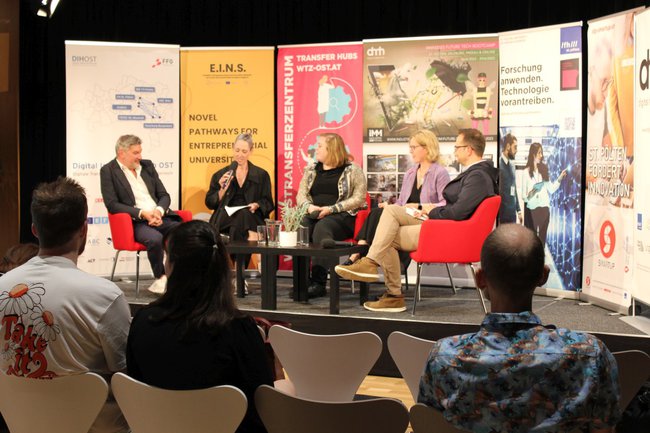Connecting Science and Art
Panel Discussion on “Visual Digitalisation & Arts”

An event at the St. Pölten University of Applied Sciences examined a world where diversity and creativity are becoming increasingly important. The focus was on bringing together projects from the STEM disciplines (Science, Technology, Engineering, and Mathematics) and the arts.
The discussion panel featured Reanne Leuning from Außenwirtschaft Austria, Veronika Liebl from Ars Electronica, Georg Russegger from WTZ Ost STEAM, and Franz Fidler from the St. Pölten UAS. The presenter was Eva Fischer from sound:frame.
“The panel members discussed how different angles and perspectives help us understand why and how art and technology can go hand in hand to promote innovation and which great potential lies in this connection and in so-called STEAM projects that successfully combine science, technology, engineering, the arts, and mathematics”, says Irene Auffret, project leader for the Wissenstransferzentrum (WTZ) Ost at the St. Pölten UAS, who is responsible for the event.
New Approaches beyond Traditional Thinking Patterns
“Within the framework of our discussion, everyone involved expressed their desire to bring the disciplines of the STEAM spectrum to eye level. Firstly, artistic discussions can profit from a scientific approach. And secondly, a scientific finding gains in radiance when it is illustrated and conveyed using the right means. Moreover, art can be a driving force when it comes to developing positive future scenarios and testing utopias or to positioning oneself with regard to social topics in a differentiated manner and with the greatest possible openness”, explains Eva Fischer of sound:frame, thereby summarising the discussion.
“STEAM thinking and transdisciplinary research and education approaches at the interface of art, technology, and science are of particular importance to us at the Ars Electronica. Europe is facing major challenges and we will be able to overcome them only if all disciplines work closely together. It will take new and creative solution approaches that live up to socio-ecological requirements as well. However, interdisciplinary skills also have to be learnt, tested in collaboration, and anchored in our ways of thinking. This is exactly why investments in STEAM education are so important”, emphasises Veronika Liebl from Ars Electronica.
“STEAM practices or, in other words, the interaction between the STEM disciplines and the arts and the creative sector enable new spaces of possibility for innovation and development with added value for society. When it comes to knowledge transfer, interdisciplinary cooperations and the integration of artists and creative minds can open up new paths towards understanding current challenges faced by society. In addition, artistic and artistically researching positions provide a change of perspective that has a positive effect on many areas of human interaction and inspiration”, says Georg Russegger from the Academy of Fine Arts Vienna, head of the project “From STEM to STEAM” at the Wissenstransferzentrum Ost (WTZ Ost).
“By applying the STEAM principles to the business world, we can also bring about changes in traditional thinking patterns and promote creative, out-of-the-box approaches, critical thinking, and interdisciplinary collaboration. This holistic approach encourages businesspeople to broaden their mindset and seek innovative solutions beyond conventional borders”, explains Reanne Leuning from Außenwirtschaft Austria.
Breaking New Ground through Exchange
“With events such as this, the St. Pölten UAS makes an important contribution to the advancement of science and research, the strengthening of their ties to the arts and the creative sector, and to the provision of a platform for much-needed exchange between all actors and institutions”, says Franz Fidler, Head of the Department of Media and Digital Technologies at the St. Pölten UAS.
The discussion was organised by the St. Pölten UAS and FH Campus Wien within the framework of their collaboration with the Wissenstransferzentrum (WTZ) Ost. The event partner was the E.I.N.S Open Innovation Hub of the European University E3UDRES2 coordinated by the St. Pölten UAS.